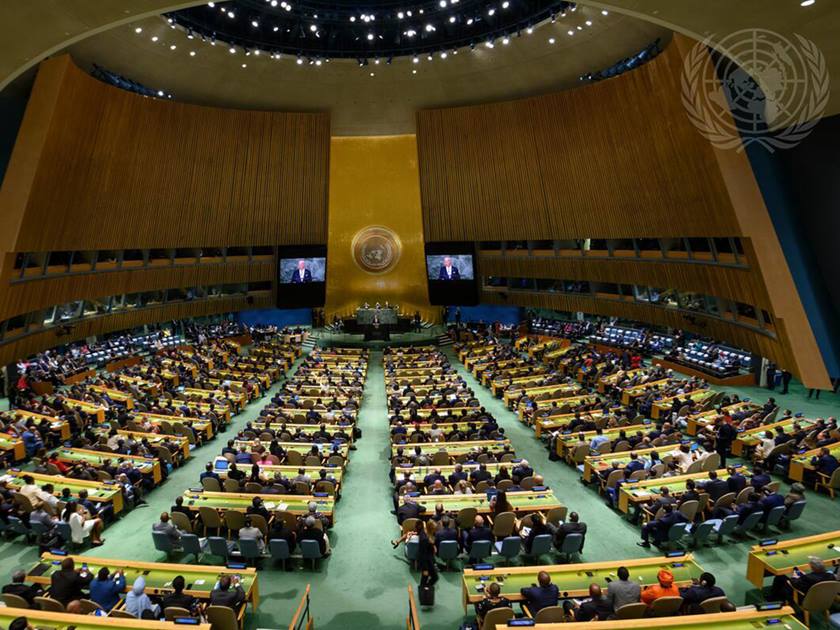Doha, September 23 (QNA) - The 77th session of the United Nations General Assembly in New York continues amid hopes that the current session may witness a long awaited change concerning the number of permanent and non-permanent members of the UN Security Council or at least pave the way for a more serious discussion, after the official support that this proposal received from the United States.
Several countries have repeatedly warned against ignoring the calls to make the Security Council more representative, more legitimate, and practical, as it may face the risk of turning into an obsolete body if the main interests of some countries that represent the significant blocs of the 192 member states of the UN, continue to be ignored.
US President Joe Biden has expressed his support for significant reform of the UN Security Council and for an increase in the number of its members, a long-standing demand of countries with demographic and economic leverage and regional effectiveness such as Germany, Japan, India, Brazil, Turkey, and South Africa, as well as calls for an increase in non-permanent members from the continents of Africa, Latin America, and the Caribbean, taking into account geopolitics and cultural diversity. These appeals remained ink on paper without actual progress, yet they came to light again during the United Nations plenary session in September 2020 and 2021.
Senegalese President Macky Sall, who chairs the African Union, had stressed earlier during the UN General Assembly the need to support the just and legitimate African demand for reforming the composition of the Security Council.
France officially supports the expansion of the Security Council and the accession of Germany, Brazil, India, and Japan, as well as strengthening the African presence and affirms that the Security Council can take up to 25 permanent members.
The credibility of the Security Council has been criticized due to what some countries describe as selective and double standards toward the grievances faced by some countries and nations, and imbalances of power, economic justice, the right to self-determination, the distribution of international aid, and stopping the attacks on countries enjoying protection from the permanent member countries that have the right of the veto. For example, the biased American support for Israel, which occupies the Palestinian territories and ignores the resolutions of the international community for decades, is due to Washingtons use of its veto against any decision that forces Israel to implement those resolutions.
The same applies to the issue of the Syrian people who revolted against the regime. Russia and China exercised their right to veto various resolutions condemning the Syrian regime's violence against its people, not to mention other resolutions in which the Security Council harmed Arab and Islamic issues.
Many observers believe that the reasons for obstructing the expansion of the Security Council's membership are not only due to the refusal of the major countries to waive the privileges they inherited as one of the outcomes of World War II and its military consequences, but there are differences even within the international groups themselves, due to different political positions and different agenda and alliances that link some of those countries and their swing between the camps of the US and Europe on the one hand, and the camp of Russia and China on the other.
The US had paved the way for its new position through its Permanent Representative to the UN Ambassador Linda Thomas-Greenfield, weeks ago when she spoke of the need to limit the use of the veto. Greenfield indicated that the US established six clear principles of responsible behavior within the Security Council so that all members have to abide by, especially the permanent members. The most important of these principles is to refrain from using the veto except on rare and unusual occasions, stressing that any permanent member exercising its veto to defend its aggressive actions will lose its moral authority and must be held accountable, according to her.
However, the American approach to reform contradicts the exact behavior of the US when it is related to its allies. It is enough to mention that the US is the second country on the list of veto users, and most of them were against condemning Israel.
On April 26, the UN General Assembly adopted, by consensus without a vote, a resolution to hold a debate in the General Assembly on the use of the veto in the Security Council. The resolution drafted by the State of Liechtenstein and approved by more than 90 countries, provides for the convening of the General Assembly, automatically within ten working days, after each time any permanent member exercises a veto in the Security Council, to discuss the situation and reason behind it.
According to the UN Charter, the presidency of the Council is held by its permanent members in rotation for one month, according to the alphabetical order of the names of the Member States in the English language. According to Article 108 of the UN Charter, the Charter can be amended by a decision of the General Assembly, approved by two-thirds of the members of the General Assembly, and ratified by two-thirds of the members, including the permanent members of the Security Council.
Since changing the composition of the Security Council can only be achieved by amending the UN Charter, Article 108 applies to the issue of Security Council reform. This issue has traditionally been discussed in the General Assembly since 1992 and, by General Assembly resolution 48/26 of Dec. 10, 1993, a subsidiary body of the General Assembly under the title "Open-ended Working Group on the Question of Equitable Representation on and Increase in the Membership of the Security Council and Other Matters related to the Security Council." This subsidiary body aims to "consider all aspects" of the issue of increasing the membership of the Security Council and other matters related to the Security Council, and since 2009, discussions have taken place within the framework of intergovernmental negotiations.
As for how the non-permanent members are selected, the General Assembly elects each year five non-permanent members of the Security Council. At its eighteenth session, in 1963, the Assembly decided that the non-permanent members of the Council should be elected according to the following pattern (Resolution 1991 A (XVIII)) five from African and Asian States, one from Eastern European States, two from Latin American States, two from Western European and other states. (QNA)


